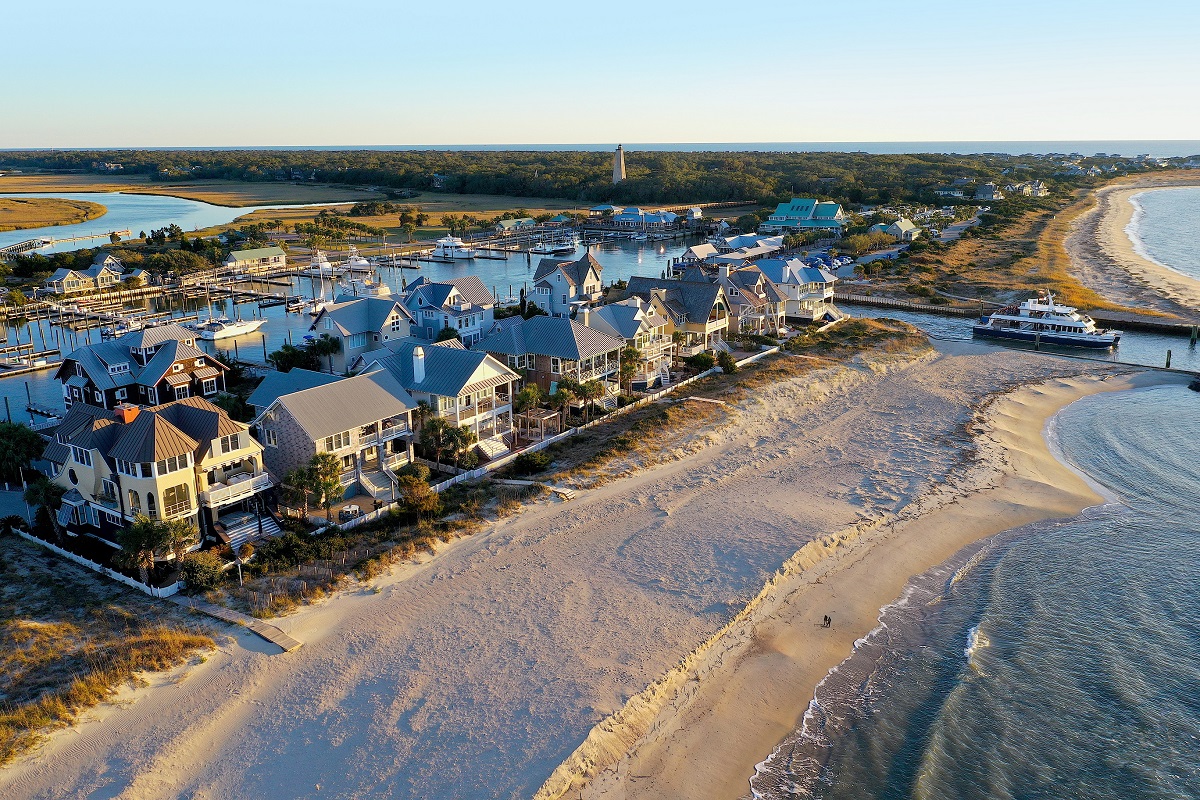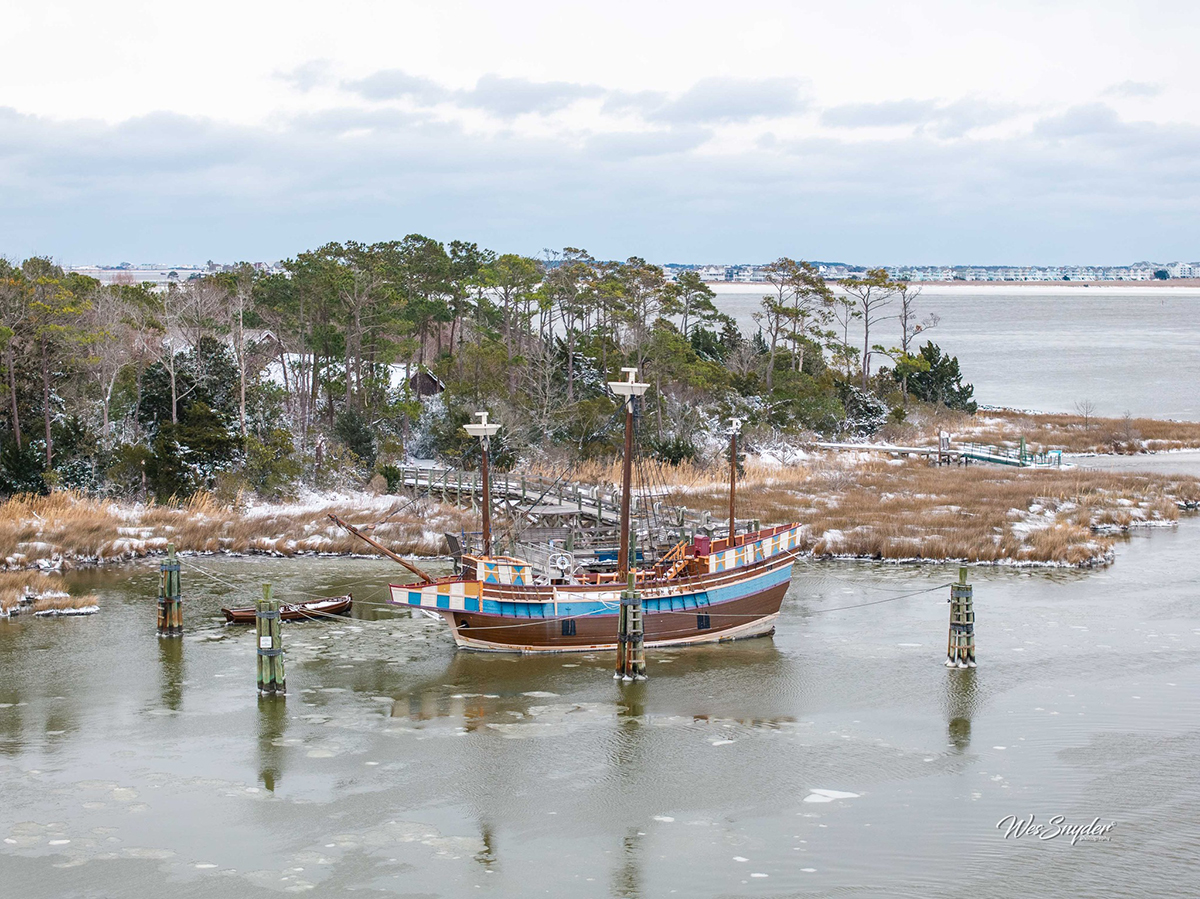
A privately owned ferry system in Brunswick County that each year shuttles more than 350,000 passengers, 90% of which are not residents, between Southport and Bald Head Island is changing hands but will remain privately owned.
Lee Roberts, managing partner of SharpVue Capital, LLC, the Raleigh-based investment company that plans to buy the Bald Head Island Ferry and associated assets, said he anticipates a smooth transition. SharpVue is buying the ferry system from Bald Head Island Limited, LLC., owned by the family of the late George P. Mitchell, who died in 2013 at the age of 94 in Galveston, Texas.
Supporter Spotlight
“I hope that we’ll be able to make some operational improvements over time, but I expect for all of the stakeholders, the homeowners, the visitors, the contractors, and the employees, they shouldn’t notice much change,” Roberts told Coastal Review Thursday. He stressed that the ferry has been “privately owned and publicly regulated in the past, it is now and it will be in the future. It’ll continue to be privately owned and publicly regulated.”
Limited announced May 31 plans to sell to SharpVue the ferry system and other assets. The $67.7 million transaction includes $56 million for the ferry and tram system, which is regulated by the North Carolina Utilities Commission, as well as the nonregulated tug and freight barge operation, and Deep Point Parking facility in Southport. The state Utilities Commission must approve the transfer of ownership.
Mitchell pioneered the hydraulic fracturing technique, or fracking, and was a real estate developer. The Mitchell family purchased in 1983 the Bald head Island’s unsold land, dedicating 200 acres of maritime forest as a preserve, and chose to depend on ferry access and golf carts as the primary modes of transportation.
“The George P. Mitchell family established and grew these infrastructure operations and assets to aid the Island’s development and this agreement transitions them to a reputable and experienced owner and operator with deep ties to North Carolina,” said Limited CEO Chad Paul in a statement regarding the sale to SharpVue. “Our team is committed to ensuring a smooth and seamless transition, for the benefit of islanders, employees, and the greater community.”
Roberts said that SharpVue was delighted to be able to acquire the assets from the estate.
Supporter Spotlight
“Obviously the status quo isn’t really an option. Mr. Mitchell passed away in 2013. You can’t have assets administered indefinitely by the estate of someone who is no longer with us,” he said.
With the sale of the ferry that transports thousands of employees, contractors, visitors and vacationers daily to Bald Head Island, passengers may be wondering if fares will increase. Roberts said the company plan to keep fares unchanged for at least a year.
Round-trip tickets will continue to cost $23 for adults and $12 for ages 3-12 for general passengers.
In 2021, according to the quarterly report submitted in February to the commission, the ferry served 376,399 total passengers. Of those, 142,850 were general passengers and 6,700 were younger than 12 and admitted at a reduced cost or free. “No frills” day visitors came to 9,915. There were also 31,898 contractor and 118,652 employee riders, 851 annual passes and 2,839 one-way tickets.
Roberts said the current management team and almost all the employees are staying in place, including the CEO and chief operating officer of the transportation company.
However, the sale has been a contentious issue for some time.
For the past five years, the state-appointed Bald Head Island Transportation Authority has been working with Limited to purchase the regulated ferry and tram system with the intention of the system becoming public.
Formed in 2017, with support of the village at the time, the authority is made up of residents of the village, Southport, Brunswick County and a member of the North Carolina Board of Transportation.
Had the authority purchased the ferry and tram as planned, it would have transitioned from being a privately owned transportation system to a publicly owned. The authority would have established rates, fees, charges, routes and schedules for transportation services.
The authority’s purchase was to be funded with proceeds from revenue bonds, which would be paid “solely from the revenues of the Ferry Transportation System generated through passenger ferry ticket sales, barge and parking charges and other fees. Neither the State of North Carolina nor any local government other than the BHITA has any obligation to make payments on the revenue bonds,” according to the authority.
In December 2020, the authority voted to approve an asset purchase agreement with Limited to acquire the ferry and barge systems and assets for a total $47.75 million. The authority requested the Local Government Commission approve around $56 million in revenue bonds.
Later that month, State Treasurer Dale R. Folwell asked the owners Limited to gift the entire system to the Village of Bald Head Island or the Bald Head Island Transportation Authority.
Village officials took issue with the “purchase price, transparency, governance, lack of responsiveness to Island concerns,” and other issues raised by various stakeholders, according to the village website, after the authority announced the asset purchase agreement. Village officials announced plans to take steps to independently purchase the system and assets March 19, 2021.
Limited officials provided a letter March 26, 2021, stating that they had no intention of negotiating with the village.
Voters in the village approved a $54 million bond referendum in November 2021, and “the Village put forward our own proposal to acquire and operate the transportation system,” according to the June 1 response to the sale. The village assumed it would pay same purchase price as the authority of $47.75 million to Limited.
Meanwhile, the sale was tied up in the Local Government Commission for more than year because some members thought the appraisal value was too high.
The authority was denied a spot on the December 2021 agenda at the behest of State Auditor Beth Wood. She wrote in a letter to Folwell, chair of the Local Government Commission, that unanswered questions remained regarding the two appraisals of the ferry system’s assets.
“Until the applications to sell bonds to purchase the assets of Bald Head Island Transportation System is supported by a valuation/appraisal that accurately and reliably sets the value of the assets, no application should be allowed on the Commission agenda at any time,” Wood wrote.
In a letter, Folwell honored Wood’s request. He explained that one of the many reasons Wood cited was that members of the commission “are bound by law to consider the applications and assessed value of the property subject to taxation and that the amount of borrowing is adequate and not excessive.”
At the end of May, the sale to SharpVue was announced. This came as no surprise to Susan Rabon, chair of the Bald Head Island Transportation Authority. She recently told Coastal Review that Limited had been transparent about their need to close the Mitchell estate.
“This was no secret,” Rabon said. “The people involved had been telling both sides for a long time, ‘We’ve got to get this done one way or another because we need to close the Mitchell estate.’” She added that Limited had been patient with the process for the authority to secure the ferry and tram system.
This leaves the authority to work out the next steps.
During the June 15 authority board of trustees meeting, Rabon said the authority had been approached by SharpVue to discuss whether there might be a role for the authority in operating the system once SharpVue owns it.
“We told them we would be interested in hearing more and having those discussions, once we knew that the authority had sufficient funding to continue to operate for at least another quarter,” Rabon explained in a follow-up interview. “Bald Head Island Limited has expressed its willingness to provide additional funding to the authority to allow it to have those discussions with Sharpvue because it continues to believe that the best outcome for the users of the ferry system is to have a regional governmental authority as the operator of the system.”
Roberts told Coastal Review that the company would be remiss to not have a dialogue both with the transportation authority and with the village as important stakeholders.
As for the transition of the ferry system and assets to SharpVue, the next step is closing the deal.
Roberts explained that the paperwork will be broken up into two parts: the nonregulated assets and the state-regulated ferry and tram system.
Closing on everything but the ferry and tram should take place in the next 60 to 90 days. Closing on the ferry and tram will take place after approval by the Utilities Commission. Roberts said he intends to file that paperwork as soon as possible.
Bald Head Island Ferry is one of eight ferry boat companies regulated by the North Carolina Utilities Commission and the transfer of ownership is subject to commission approval.
Lucy Edmondson, interim chief counsel for the Utilities Commission, explained in an email response to Coastal Review that the Bald Head Island Ferry is a public utility under North Carolina law and its rates and service are regulated by the state Utilities Commission.
“While the application for approval of the transfer has not been filed yet. When it is filed, the Public Staff, which is the consumer advocate for ratepayers, will investigate the application for transfer and file testimony that will provide the results of its investigation and make a recommendation as to whether it is in the public interest for the ferry to be transferred,” she said.







